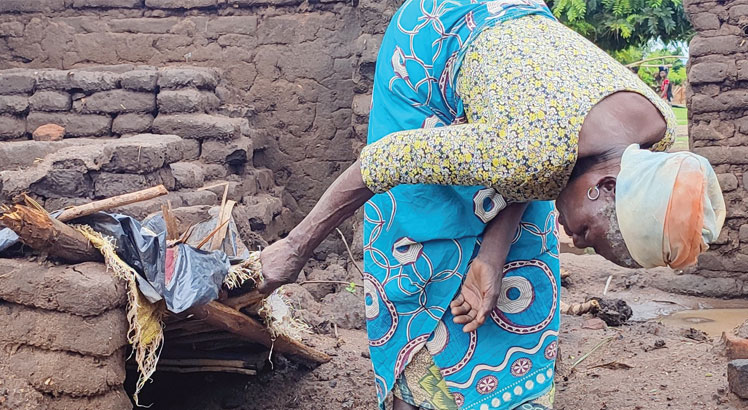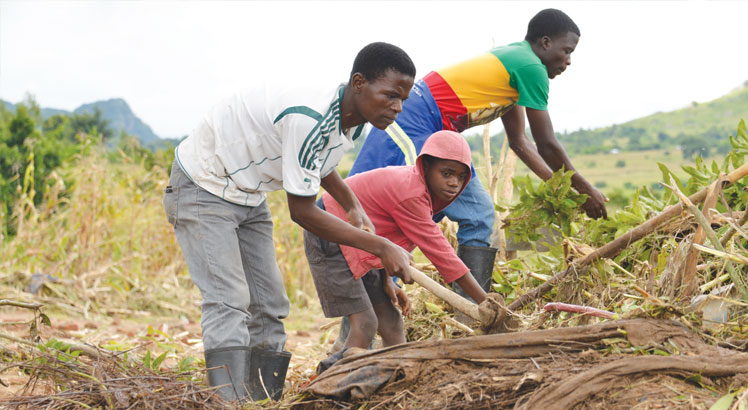Utaviya Paulo’s life is now merely a satchel of broken dreams. Adding to her frailty from old age, the survivor of Cyclone Idai, is as good as homeless, a moving frame of hopelessness.
The 76-year-old’s house collapsed following a bombardment of long-lived storms that tore through the soul of the nation in 2019, causing catastrophic damage and a humanitarian crisis. One million people were affected.
Four years on, Paulo’s house in Traditional Authority Pemba in Salima district, just like her future, still lies in ruins.
She now lodges in a hut with cracking clay walls and draped with mosquito nets which a neighbour offered her as she battled destitution.
Paulo shares her room with four goats. Though the animals pose a health hazard, they are her only source of economic hope.
“I am too weak and poor to mobilise resources to build another house. In addition, I struggle to feed my family,” says Paulo, who looks after three grandchildren.
Her sad turn of events is shared by thousands of Malawians who, every passing year, lose property and livelihoods to disasters.
As years roll on and the survivors struggle to recover from the social-economic losses, one thing becomes crystal clear; they have become a dire joke of efforts to alleviate global suffering pinned on the United Nations (UN) championed Sustainable Development Goals (SDGs).
From ending hunger, gender inequality and violence against women to expanded access to education and health care, the 17 SDGs were approved unanimously by UN members in 2015, with 2030 being the deadline.
Paulo checks on dogs sheltered on what used to be her house
With seven years remaining before the implementation period expires, the country’s SDGs’ bid has been under threat amidst perennial floods, economic meltdown, Covid-19 and cholera.
The challenges are triggering fears that the country may not fulfil the ambitious goals. Centre for Social Concern (CfSC) economic governance and programmes manager Bernard Mphepo is among the doubting Thomases.
“With the outbreaks, natural disasters and economic shocks, it is unlikely that the country will achieve the SDGs,” he said in an interview.
The signs depicting the country’s struggle to attain the ambitious global goals are written all over the wall and there are only a few crumbs of optimism.
The State-owned National Planning Commission (NPC), which shapes the country’s development, observes that the nation has not made significant progress in eliminating poverty and reducing inequality in wealth distribution which are goals One and 10, respectively.
In its Malawi Voluntary National Review Report for SDGs the Commission assesses: “people across the country, especially rural women, children, youth, and persons with disabilities indicate that their poverty status has worsened.
“The increase in poverty levels was mainly attributed to the rising cost of living and poor performance of the agriculture sector.”
Posted on www.npc.mw, the report singles out six goals where Malawi has made moderate progress on. They are: Gender Equality; Affordable and Clean Energy, Decent Work and Economic Growth, Industry, Innovation and Infrastructure, Climate Action and Partnerships for the Goals.
According to the assessment published in 2022, Malawi has made significant progress on four goals: Zero Hunger; Good Health and Well-being; Quality Education and Clean Water and Sanitation.
But the portrayed gains in clean water and sanitation seem to have merely been cosmetic if the current cholera outbreak is a yardstick. With the death-mark nearing 2 000 and cases cruising past 60 000, the pandemic, which started last year, is the worst in decades.
The World Health Organisation attributes the cholera upsurges in 13 African countries to poor investment in water, sanitation and hygiene services.
“Many more preventable cases and deaths could occur for several weeks if drastic actions are not taken,” warned WHO regional director Matshidiso Moeti at the recently held emergency ministerial meeting in Lilongwe.
Coming on the back of the Covid-19 pandemic, which left the economy on its wobbling knees as it took away thousands of jobs and businesses, cholera has shaken the recovery plan as millions are being spent to tame its further spread.
And, blatantly honest was the Minister of Health Khumbize Kandodo- Chiponda in her assessment of the country’s challenges as it pursues global goals.
During a virtual Voice of the South Summit which India organised in January this year, she said: “Malawi just like the rest of developing countries, natural shocks expose our vulnerability and lack of depth in sustaining quality health service delivery.
“The developing countries are stagnating in the attainment of the global agenda mainly due to limited fiscal space for meaningful investment.”
And, currently, Malawians are nursing a hangover from another disaster: Tropical Cyclone Freddy. It has wiped out 300-plus lives, displaced over 25 000 households and damaged massive infrastructure in the Southern Region worth billions of Kwacha.
Minister of Finance and Economic Affairs Sosten Gwengwe acknowledges that natural disasters and outbreaks pose a threat to achieving the goals.
He adds that financing for development has been another key challenge.
“To enhance SDG financing, Malawi has put in place deliberate efforts to go beyond conventional means of financing to include more private sector involvement, non-concessional loans and other financing instruments in the development space to allow for constructive SDGs-related investment in various sectors of the economy,” he says.
Meanwhile, economist Wisdom Mgomezulu has warned that the country’s failure to strengthen the country’s prevention against disaster will be its undoing in MDGs quest.
“Disaster Risk Reduction remains an integral part of social and economic development. What is clear is that a lot of effort and resources have focused on ensuring preparedness and recovery as opposed to prevention,” he says.
Mgomezulu, a lecturer at Lilongwe University of Agriculture and Natural Resources, remarks that the increasing number of deaths from disasters is a testimony that the nation is backsliding in the SDGs.
“Sadly, we will go back to look for resources that will aid in the response and recovery instead of totally preventing future occurrence of loss of lives, property and direct economic losses,” Mgomezulu charges.
But CfSC offers some hope that all is not lost but demands that the country strengthens its fight against corruption and muscle up on resilience against economic shocks.
“We need to build resilience of economic shocks through promoting transparency and accountability on public finance management
“High levels of corruption will lead to failure of the country on sustainable goals. we also need to industrialise and commercialise agriculture for the country to achieve the SDGs,” the organisation’s programmes manager Mphepo remarks.
In its report titled ‘People’s Score Card’ released last year, the Council for NGOs in Malawi blames the poor implementation of SDGs partly on lack of awareness among the citizenry.
“More citizens are not aware of the SDGs, a situation which can incapacitate their fruitful participation in their realisation.
“So many sectors are lagging behind in the rural areas, requiring more action if citizens are to be transformed. More financial, technical and material resources are required to ensure vulnerability is reduced in the communities,” it says.
As part of the solutions, the council advises: “Politicians should perform their tasks as stipulated in the policies and laws as interference…
“Corruption is dragging development progress at the local level requiring urgent action… Citizens in rural areas are tired of poverty and they need help ranging from empowerment to demonstrating seriousness in development planning and implementation.” Hope may blur the SDGs lines, but deep down their hearts, Utaviya Paulo and all those trapped in disasters and poverty know distinctively well that the lean dark days are far from over.
The post Disasters blur global goals hunt first appeared on The Nation Online.
 Moni Malawi
Moni Malawi 

